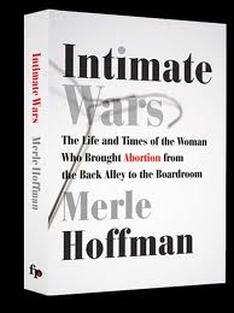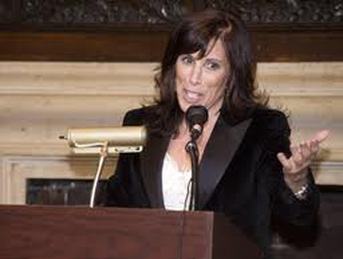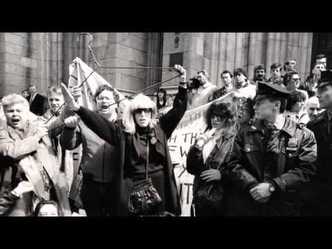
The woman is Merle Hoffman, who established Choices Women’s Medical Center shortly after New York legalized abortion in 1971—two years before Roe v. Wade. Abortion, unlike many other issues taken up by Second Wave feminists, remains as hotly contested and as much of a political football as it was back in the day.
Hoffman’s book is, frankly, a page-turner. She has not held back from revealing her personal story—one that is fraught with the kinds of contradictions that made for good drama. She unflinchingly documents an era and a battle that have been controversial even among the ranks of activists. And she does something else that this reader found to be of enormous value. She models the attitudes and strategies it takes to win against a formidable adversary. She talks about the deep work, the transformational work necessary to bring about social change, even as she shares the details of her public campaigns.
 Merle Hoffman
Merle Hoffman MH: In a sense I believe that Patient Power is more important now than ever. At the time I was calling for a Reformation there was practically no medical information available to patients (mainly women). The language was one that only doctors could understand and this medical language contributed to women remaining passive consumers of their own health care.
I wanted women to be able to understand in plain English what treatment was being proposed, what risks were involved and if there were any options.
Now with the Internet, medical information is available to almost anyone anywhere at any time enabling individual patients to become more assertive—but patients as a class face an even more intractable challenge which is the fact that the doctors are not virtually available. With the ever rising numbers of the uninsured, the consistent attacks on any government funding to assist the poor, and the egregious escalation of the attack on reproductive rights, women as patients are in an even more precarious situation.
And what is required to make real change to address an inequitable and profit driven health care system is collective action.
 Hoffman with the iconic coat-hanger
Hoffman with the iconic coat-hanger "… attempting to simplify the issue, refusing to look at the consequences or true nature of abortion—the blood, the observable parts of the fetus, the irrevocable endings, the power of deciding whether or not to bring a new life into this world—reduces our capacity to register the depth of this issue and disrespects the profound political and social struggle women’s choices engender in our society."
 Leading the charge
Leading the charge MH: Head on—I acknowledge that abortion is the termination of potential life—and reinforce that it is the individual woman who has the legal moral and ethical responsibility to make that decision. Reproductive justice is a human right—and the denial of rational moral agency to women deprives them of their humanity.
CG: In your book, you talk about the tactics of anti-abortion activists and the need for abortion rights activists to be as visible and as vocal. One of the brilliant actions you organized with the New York Pro-Choice Coalition was a press conference held literally in a back alley, effectively making the point that banning abortions will only drive them underground. Do you feel that there is a need for more of this kind of grassroots activism, or in 2011 has the issue moved to lobbyists and politicians?
MH: Women have to come out of the closet on this issue—in all the years since I have been fighting this issue—admitting that one has had an abortion still remains difficult. It has not become any easier to have abortion without apology. The first action has to be in each individual woman’s heart and mind—to accept her choice as a “mothers act” and bond with all other women struggle to make their own choices. One march-one action is not enough—it can be great theater—but this issue requires a revolution of consciousness—and individual psychological courage.
CG: In your chapter, “The Loaded Gun,” you discuss your work to empower patients in situations involving domestic violence, and how this work translated to your own response to the growing terrorism directed against abortion providers. You talk about the deep social conditioning of women to respond as victims. I see a Catch-22 dilemma here: How can women who do not feel biologically entitled muster the attitude of resistance necessary to defend that entitlement?
MH: See above—which is why each one of us has the responsibility of being soldiers in this battle—and why this war is “Intimate”—because we have to fight it within ourselves—we have to fight the enemy who has outposts in our heads and hearts.
CG: I appreciated your clarity about the roots of the struggle: “As long as people see abortion as immoral, its legality will be in danger.” This obviously is going to take more than legislation. How can we fight and how can we win that battle when liberals lack the monolithic machinery of the so-called Religious Right?
MH: Position the issue in terms of Reproductive Justice and Human Rights—once again-work on women accepting their power as mothers--work in coalition with other human rights struggles--it will take a long time—which is why I always see this as a generational struggle and do not allow myself to become despairing or depressed about the ebbs and flows of the battles—I am grateful to be part of the struggle (can’t say I am not getting tired though!)
Footnote: Merle Hoffman is also the editor of On the Issues: A Magazine of Feminist, Progressive Thinking. The theme of the Winter 2012 issue is abortion.

 RSS Feed
RSS Feed
